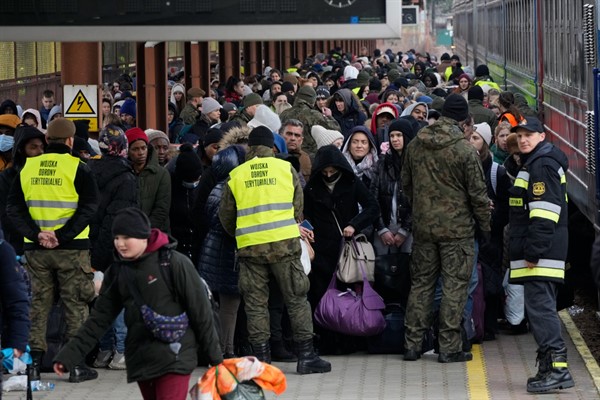This dynamic is once again on display today. The same EU states preparing to welcome Ukrainians with open arms continue to erect legal and physical barriers to deter a far smaller number of non-European refugees currently languishing—and freezing—on the EU’s borders. In Poland, for example, authorities are building border walls and allowing border guards to routinely push back Middle Eastern refugees and migrants into Belarus. In Southern Europe, authorities continue to forcibly return refugees to Libya, where most end up in militia-run prisons so hellish that European diplomats themselves have likened them to concentration camps. Just last week, the U.N. Refugee Agency warned that illegal pushbacks and other abuses have become “normalised” across Europe. The same incongruity is already evident in the bloc’s response to the Ukrainian crisis itself. Reports are growing of discrimination and violence against African, Asian and Caribbean migrants as they attempt to flee Ukraine. Footage showing Black migrants being barred from boarding trains for the border have gone viral. News headlines along the lines of “Pushed back because we’re Black” are proliferating. EU authorities have responded by saying that “Everyone who has to flee Putin’s bombs will be welcomed with open arms,” regardless of nationality. But reports to the contrary continue to mount. The double standard is not accidental. As Bulgarian Prime Minister Kiril Petkov explained in a recent press conference, referring to Ukrainians, “These people are intelligent, they are educated people.” He added, “This is not the refugee wave we have been used to, people we were not sure about their identity, people with unclear pasts, who could have been even terrorists,” before concluding, “In other words, there is not a single European country now which is afraid of the current wave of refugees.” Speaking anonymously to the Washington Post, another European official concurred, saying, “Honestly, the sentiment is different since [Ukrainians] are White and Christian.” That does not mean that Ukrainian refugees will not face significant discrimination and hardship. Europe has its own internal, deeply rooted social hierarchy; prior groups of European refugees, while initially welcomed, have seen their hosts’ generosity dry up. But the markedly disparate treatment now on display merits urgent attention. Coming, as it does, on top of the West’s vaccine inequity and failure to provide developing countries with sufficient financial assistance amid the COVID-19 pandemic, a two-tiered refugee policy may alleviate tensions within Europe, but it will not help increasingly fraying North-South relations. As Dr. Ayoade Alakija, a special envoy to the World Health Organization, decried on Twitter, the “West cannot ask African nations to stand in solidarity with them if they cannot display basic respect for us even in a time of war. Ignored in a pandemic and left to die in war?!!” Already, a growing number of African governments—including Ghana, Nigeria and Kenya—are expressing outrage over reports of discrimination at the Ukrainian border. As Nigerian President Muhammadu Buhari stated Sunday, “All who flee a conflict situation have the same right to safe passage under UN convention and the colour of their passport or their skin should make no difference.” Meanwhile, the impact of the crisis on the overwhelming majority of the world’s refugees who reside outside of Europe is of equally pressing concern. The exodus from Ukraine will likely feed into narratives among European publics that the continent is “saturated,” making it even more difficult for vulnerable Afghans and others to secure resettlement. Moreover, financial aid for refugees beyond Europe will almost certainly decrease as attention and funding shifts to Ukrainians displaced by the Russian invasion. Given the pandemic-induced economic crisis, as well as the likely economic fallout from sanctions and supply disruptions due to the war in Ukraine, EU states will conceivably be even more eager to shift their foreign aid budgets toward the costs of accommodating refugees domestically, and away from aid for refugees in countries such as Lebanon or Uganda, than they were in 2015-2016, when roughly 20 percent of global humanitarian dollars was diverted to domestic use. This will occur just as global humanitarian needs are skyrocketing, most notably in Afghanistan. Europe should be commended for opening its arms to Ukrainian refugees, who deserve every ounce of solidarity that the continent, and the world, can muster. Rather than diminishing the West’s attention to current crises in Africa and the Middle East, though, the Ukrainian crisis should remind us of the horrific conditions faced by refugees everywhere, and the need, finally, for a humanitarianism without hierarchy built into it.The EU’s response to Ukrainian refugees is a rare and desperately needed instance of collective solidarity. But it also reinforces the double standard that has, for far too long, driven global and European refugee policy.
Leah Zamore directs the Humanitarian Crises program at New York University’s Center on International Cooperation. She is the author, with T. Alexander Aleinikoff, of “The Arc of Protection: Reforming the International Refugee Regime” (Stanford University Press, 2019).

